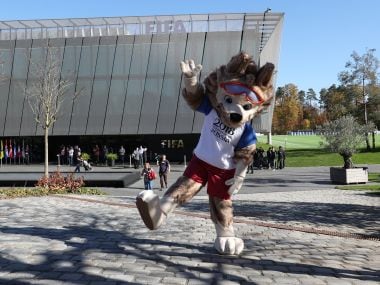FIFA World Cup 2018: Russia hopes influx of fans from across the globe helps achieve economic goals
Moscow: Despite selling mugs and ornaments at Moscow's top souvenir market, Alexander does not expect a huge boost when hordes of flush fans descend on Russia this summer for the World Cup.
"You would think that the World Cup would be great for selling souvenirs, but not for us," said Alexander, a victim of pre-emptive anti-terror measures that will shut most of Izmailovsky and other outdoor markets.
His case begs the question what will be the economic impact of the World Cup really be for Russia?

The mascot of Russia 2018 before the play-offs draw. Reuters
An influx of hundreds of thousands of football fans will set cash registers ringing, but will it provide a lasting boost to Russia's lacklustre economy?
A study conducted by the McKinsey consultancy for the local organising committee estimated "the combined impact of the 2018 World Cup on the GDP of Russia will be abound $15 billion, which exceeds the impact of similar championships in Brazil, South Africa, Germany and South Korea, and is second only to the result of Japan."
While that sounds big, it is mostly investment in stadiums and transport infrastructure, and when broken down over the six years that preparations have been underway, the impact is less than 0.2 percent of Russia's annual output.
Those investments didn't help Russia avoid a recession in 2015 and 2016 and overall growth is only expected to reach 1.5 to 2.0 percent in the coming years.
No meaningful impact
"The games will last just one month and the associated economic stimulus will pale in comparison to the size of Russia's $1.3 trillion economy," said Kristin Lindow, a Senior Vice President and analyst at Moody's rating agency.
"We do not expect the World Cup to make a meaningful contribution to broader economic growth."
However the McKinsey study forecasts the economic impact from the games to increase by up to a third over the next five years, primarily due to a boost in tourism.
"Overall, in my opinion the World Cup will increase tourism to Moscow by 10 percent," Moscow Mayor Sergei Sobyanin said in a recent interview on RBK television.
He estimated this lift would in turn boost the city's annual tax revenue by nearly a quarter of a billion dollars.
But Igor Nikolayev, director at the FBK Strategic Analysis Institute in Moscow, said he was sceptical of such forecasts.
"Holding the World Cup is no guarantee that a considerably larger number of tourists will come," he told AFP.
He pointed to Russia's experience with the Sochi 2014 Winter Olympics, when the number of foreign tourists rose by nearly 1.5 million the following year, a modest four percent increase, only to tumble by over nine million in 2016, according to UN figures.
And the spike in international tensions — Western sanctions over Russia's annexation of Crimea and a separatist conflict in eastern Ukraine — that damaged Russia's pull as a tourist destination isn't likely to go away anytime soon.
Prices boom
Nevertheless organisers recently said they expected at least 600,000 international visitors to the World Cup.
And even if it is closer to the one million the state tourism agency is forecasting, that is no flood when considered against the relatively low 24.6 million visitors Russia received in 2016.
And it is less than the 1.6 million boost Russia received in 2014 for the Sochi Olympic games.
But with nearly 700,000 Russians also expected to attend matches, hotels and restaurants in game cities are likely to see plenty of business.
The Didu restaurant on Moscow's central Myasnitskaya street has crafted a soccer goal over its entrance with a massive ball bouncing on top to attract football fans.
"We’re welcoming foreign guests," said manager Maxim Zakharov. "We’ve set up the goal, hung up flags, put up a huge plasma TV… but we haven’t raised prices."
Tour guides will also be busy.
"We expect we will set a record this year thanks to the World Cup," said Vyacheslav Kholopov at Moscow Private Tours, adding most tours were already fully booked.
He put the increase at roughly 50 percent from an ordinary summer.
Apartment renting site Airbnb said its hosts would house nearly 177,000 visitors during the World Cup.
It did not provide price data but a random survey of 20 apartments listed on Airbnb in central Moscow found most had tripled prices from the rate in late May, with one host seeking to obtain 14 times more.
A similar look at hotels on Booking.com found many were seeking 2-3 times more for a room compared to late May.

No comments:
Post a Comment